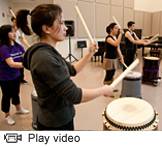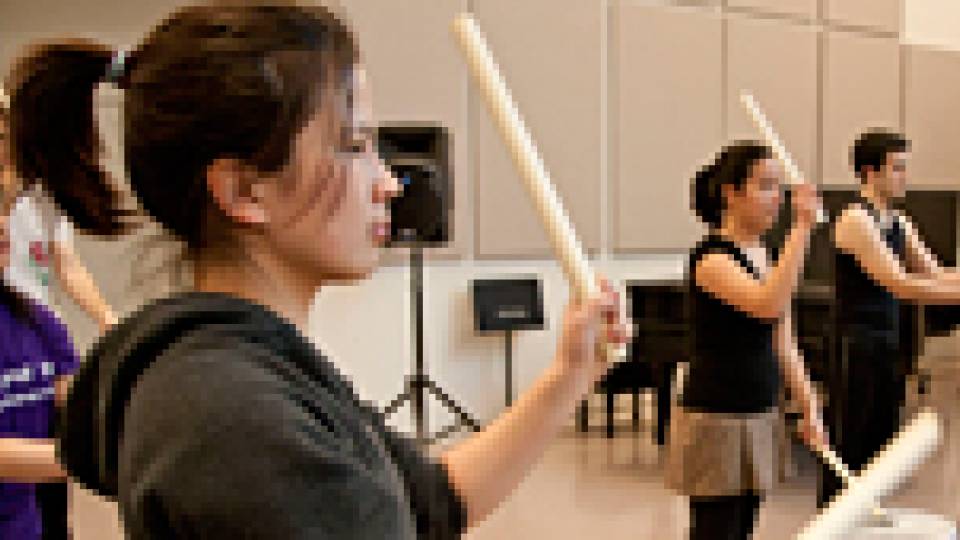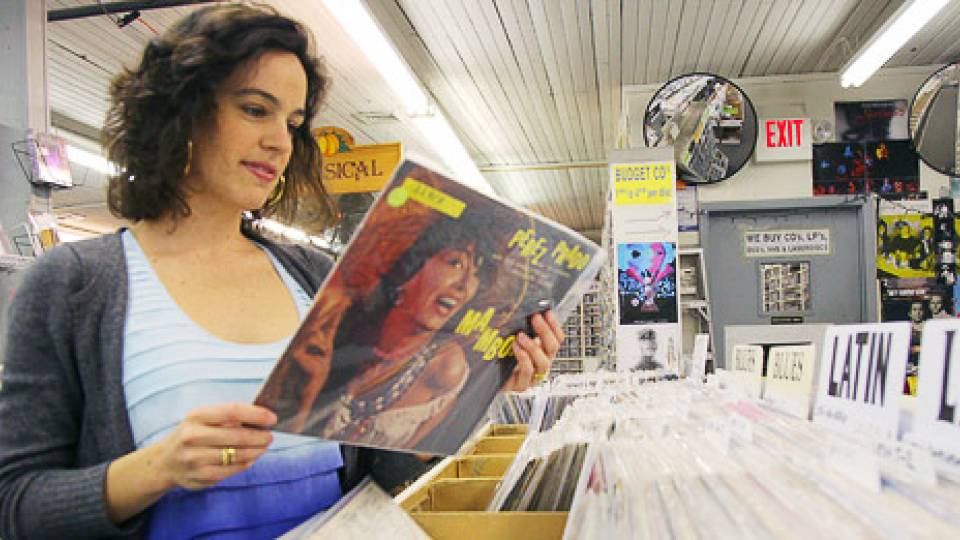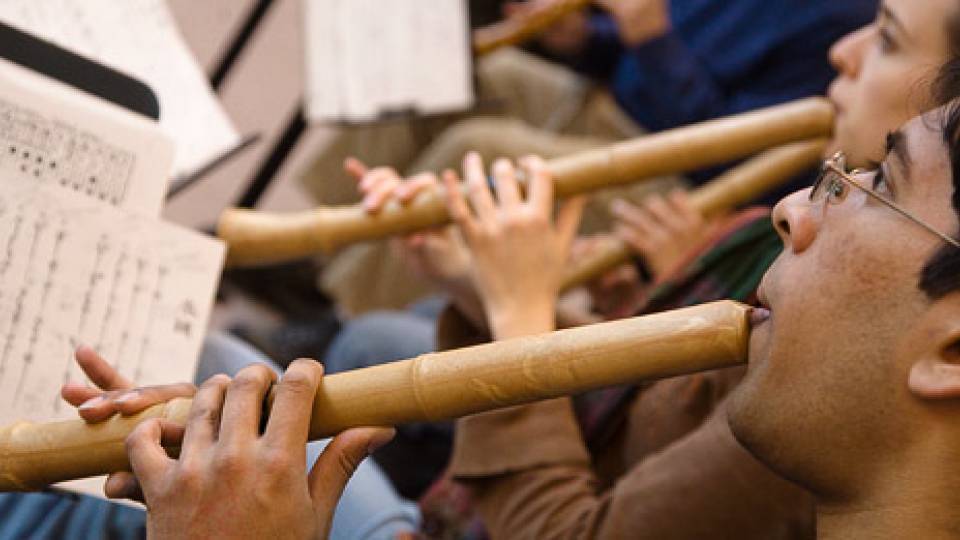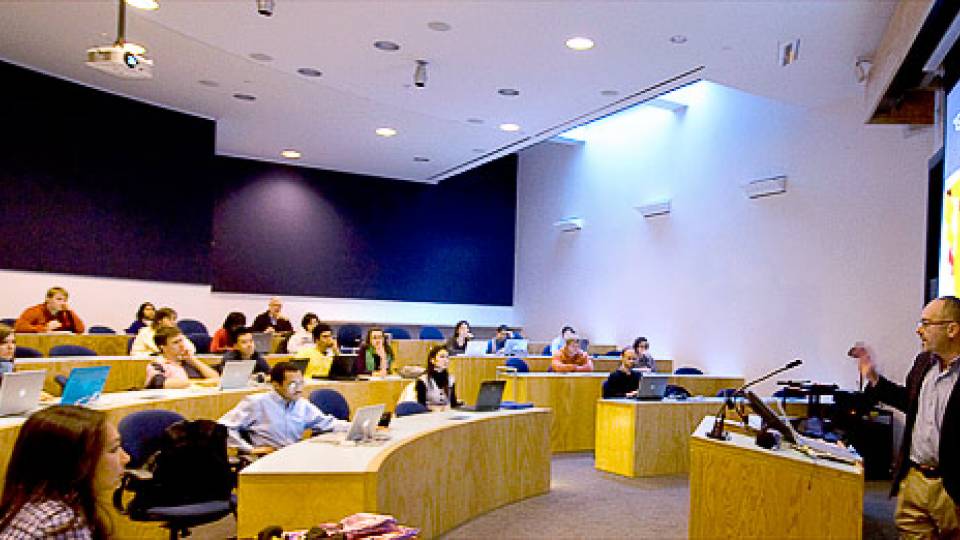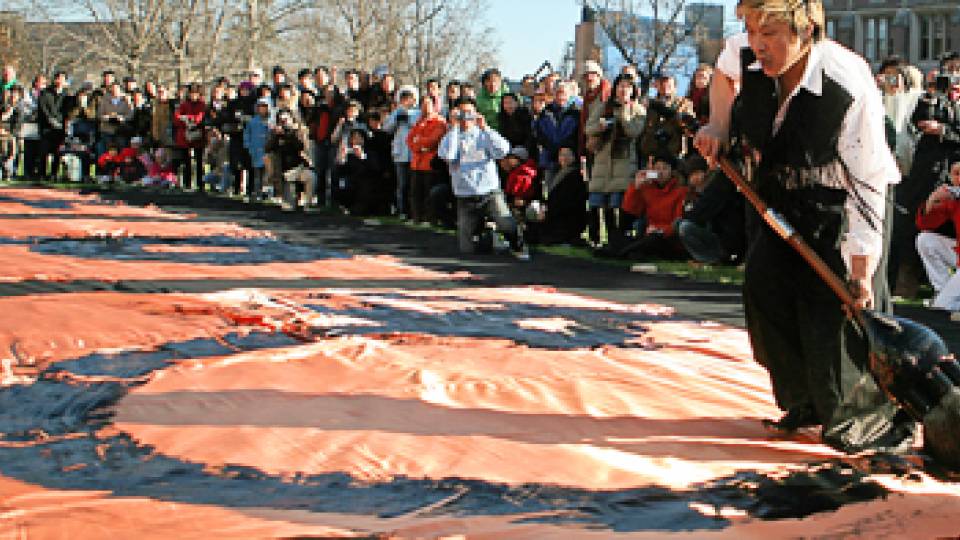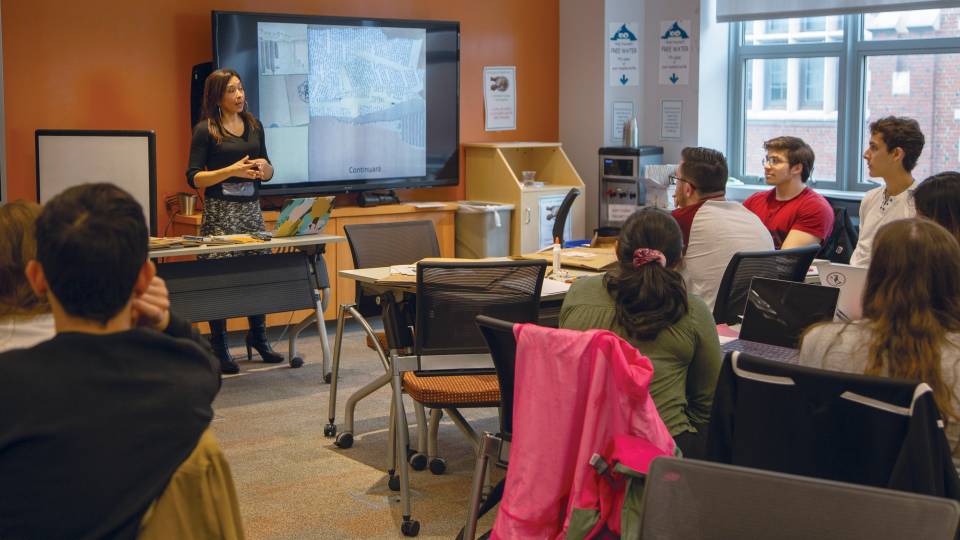Noriko Manabe's path to teaching music at Princeton is as unconventional and eclectic as the musical cultures and styles she studies.
Manabe came to academia from the investment and consulting fields, where she was a leading analyst of the technology and media industries in Japan and often was cited in the press as an authority on major companies such as Sony and Nintendo. As she traveled around the world for business, she continued to feed her own love for music, growing increasingly fascinated by the cultural and social contexts of global music.
Even as she excelled in the financial arena, Manabe held onto a lifelong desire to pursue the study of music more fully. In 2003, she decided to reinvent her career and enrolled in the City University of New York's graduate program in music.
"Going to graduate school in music was a longheld aspiration of mine -- something I had considered since college," Manabe said. After a successful career in business, she felt that the time was finally right to pursue music studies full time.
She earned her Ph.D. last year with a double concentration in ethnomusicology and music theory, then joined the Princeton music faculty in the fall. In her first year at the University, she quickly has generated interest across campus in her work on popular music in the West, Japan and Latin America.
Manabe is the music department's first full-time ethnomusicologist, studying the social and cultural aspects of music-making. Her research ranges from Japanese hip-hop and children's songs to the influence of Italian opera on Latin boleros.
"While my work involves a spectrum of musical styles and artists, the primary themes that interest me are using music to understand issues of globalization, as well as examining the interaction of music with language," said Manabe, who is an assistant professor.
In addition to teaching three courses this year, Manabe has organized two series of colloquia, on popular music and non-Western music, for faculty and students from various departments to share research and develop an appreciation for different methodologies used to study music. She also has brought in guest musicians for hands-on workshops and public performances, and was among the co-organizers of the conference, "Intellectual Property and the Making and Marketing of Music in the Digital Age," co-hosted by the Center for Arts and Cultural Policy Studies, the Department of Music and the Center for Information Technology Policy.
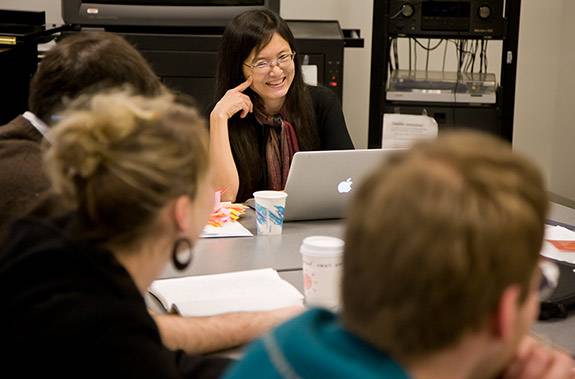
Manabe is the Princeton music department's first full-time ethnomusicologist. Her research ranges from Japanese hip-hop and children's songs to the influence of Italian opera on Latin boleros. (Photo: Denise Applewhite)
"Noriko has managed, in a very short time, to build synergy between music and other departments such as English, the Center for African American Studies, and East Asian studies," said Steven Mackey, professor and chair of the Department of Music. "She is a catalyst, sparking a campuswide awareness of the work that has already been going on in the department but may not have been fully acknowledged."
Her efforts also are introducing students to ideas about music from parts of the world not traditionally on the department's musical map, Mackey said.
"Japanese hip-hop, taiko drumming and Cuban music are a few of the areas that Noriko is taking us to that we've never been before," he said.
Teaching rock, reggae and taiko
Manabe was born in Kyoto, Japan, and her family moved to North Carolina when she was a young girl. She could play the piano by ear when she was 3 and was a featured soloist with a local symphony orchestra when she was 13.
Though Manabe's first training was in classical piano, it was rock of the late 1960s and 1970s that sparked her interest in popular music.
"It was quite an exciting period, with Jimi Hendrix, Led Zeppelin and Janis Joplin, and I developed a deep musical affinity with heavy rock from that era," Manabe said.
Manabe majored in music and mathematics as an undergraduate at Yale University. After graduation, she got a job in management consulting and went on to earn her master's in business administration at Stanford University. During this time, Manabe -- who has learned to play about 15 instruments at various times -- stayed connected to music by performing in rock bands and singing in choirs.
Now at Princeton, Manabe's interest in popular music has led her to teach two courses this semester on the subject: an undergraduate course cross-listed with East Asian studies on "Popular Music in Japan, 1877 to 2010" and a graduate seminar on "Topics in Popular Music."
"Popular music is such a rich field," Manabe said. "There are many interesting aspects to its study, such as: how a genre of popular music reflects on society at large or the group of people who listen to that music; or why individuals are drawn to a particular genre of music out of the many that they may hear Popular music can also be much richer and more innovative from a purely musical perspective than people give it credit."
Manabe said her graduate seminar has attracted students from both the composition and music theory programs, with the class analyzing rock, soul, pop, hip-hop and electronic dance music from the late 1950s to the present. The class incorporates materials from diverse sources. In one recent seminar, the class viewed the musical "mockumentary" "This Is Spinal Tap" in a discussion of rock styles.
Her course on popular music in Japan was developed for undergraduates of all majors. Manabe leads students in listening exercises and analyses of translated lyrics to consider the ways in which music reflects Japanese identity and the reception of Japanese musicians overseas.
The course draws much from Manabe's field research in Japan, where her work has included studies of cell phone ringtones and the music business -- subjects she began following while working in the investment industry.
The class also introduces students to some of the artists working in modern Japanese music. During a recent session, taiko drummer Kaoru Watanabe taught students Japanese ensemble drumming, which is popular in Japan and North America. During the lesson, Manabe and students stood together beating sticks across the wide instrument to experience the rhythms of the music firsthand.
Manabe will co-teach a course in taiko drumming with Watanabe during the upcoming fall semester, in which students will learn taiko as a means to gaining understanding of national identity in Japan and Asian American identity in the United States.
Leon Ho, a rising junior majoring in computer science, said he enrolled in Manabe's class because of a personal interest in Japanese pop music, known as J-Pop.
"I have never taken a music course before, but Professor Manabe's broad range of expertise helps me visualize the connections between music from different origins and understand concepts that are not intuitive to me," Ho said.
Christine Lai, who graduated earlier this month, had a similar experience in Manabe's class on non-Western music this past fall. The class focused on musical cultures in Spain, Bali, India, Japan and Cuba, where Manabe has done extensive research on Cuban singer-songwriters, operettas and concert music.
"I took the class because I was eager to learn about music that was foreign to my ears," said Lai, a chemical engineering major. "Professor Manabe exposed us to academic literature, YouTube videos, workshops and local performances that I wouldn't have known otherwise and that provided a comprehensive perspective on the music we were studying."
Musical research around the world
Professor of Comparative Literature Thomas Hare, who has worked with Manabe on the taiko workshop and colloquia series, said he is pleased to see how she has thrived in less than a year at Princeton.
"I think her expertise in contemporary and popular Japanese music makes for a great resource for faculty and students with East Asian interests, as well as for scholars and aficionados of music in general terms," said Hare, the William Sauter LaPorte '28 Professor in Regional Studies.
Manabe's varied knowledge in popular and Japanese music is rooted in research she conducted for her doctorate, as well as ideas she is currently exploring.
"My dissertation examined the process by which Western musical styles take root and evolve in Japan, and I'm now working on a project about the development of rock, hip-hop, reggae and electronic dance music scenes in Japan," Manabe said.
Her multiyear journey into the study of Japanese music scenes started with a passing remark made during a class discussion by a fellow CUNY graduate student that all Japanese hip-hop was an imitation of hip-hop from the United States.
"I decided I could not let the comment go. I explained that it was not possible for Japanese rap to be a strict imitation: while American rap is based on rhyme, Japanese poetry is not based on rhyme," Manabe recalled. "The syntax of the Japanese language also makes it sound somewhat silly to rhyme. Sentences end with auxiliary verbs, and there are only a few auxiliary verb endings."
The response caused her professor to invite Manabe to develop a class presentation on Japanese rap. It turned into an article in the Journal of the Society of Ethnomusicology that, emblematic of her research style, looked at music from the perspectives of globalization and linguistics.
"I showed that Japanese hip-hop artists developed a new style of urban poetry by forwarding a rhyming scheme that breaks syntactic rules, putting key words at the end of a line of verse. They use words of Japanese, Chinese and English origins to form rhymes. It's quite clever," Manabe said. "The project was an interesting case study on the process of globalization in popular music, where a genre is reinvented in another shore. If you take a musical riff here and implant it there, you don't necessarily expect it to mean the same thing as it originally did -- it usually doesn't."
The study of Western influences on Japanese music also is seen in Manabe's research on how children's songs reflected the country's educational policy and geopolitical positioning from the 1880s through 1947. Manabe said she became interested in the subject because children's songs, like Japanese rap, are an example of how the language affected the way a musical genre was adapted.
"In the 1880s, the Japanese government made a conscious decision to make music education mandatory, and they decided to introduce Western music at the exclusion of traditional Japanese music," Manabe said.
This introduction of Western musical styles to Japanese children from an early age is part of the reason why hip-hop, reggae and other non-Japanese genres are popular in Japan, Manabe noted.
"Most Japanese know Beethoven and the Beatles much more thoroughly than bunraku, a traditional Japanese puppet theater," Manabe said.
Through her research, Manabe said she has kept up relationships with the contacts she made while she was working as an equity analyst in technology and media companies.
"Now I am going back to some of these companies in the music, Internet and media industries to study musical trends in Japan and the impact of corporate policies and infrastructure on music," Manabe said.
Her research also has led her on extensive travels throughout Latin America, where she has focused on examining connections between language and music.
One of Manabe's major projects in the region traced Cuban singer Silvio Rodriguez's evolution as a protest songwriter to an artist who was embraced by the Castros' government as a Cuban cultural ambassador. Although his lyrics have changed during the stages of his musical career, Manabe found it revealing that Rodriguez has continued to use the same musical patterns to convey certain sentiments such as resignation or postures such as didacticism.
And while she continues to travel the world examining musical styles, Manabe said she is finding new insights and influences within the walls of her classroom.
"Two of the classes I've taught here are not geared toward students who have studied music before. It is very interesting to see how students draw on their diverse backgrounds to interpret musical styles that they may not have heard before," Manabe said. "You can also learn about new kinds of music from students -- which I love, as a scholar of popular music."
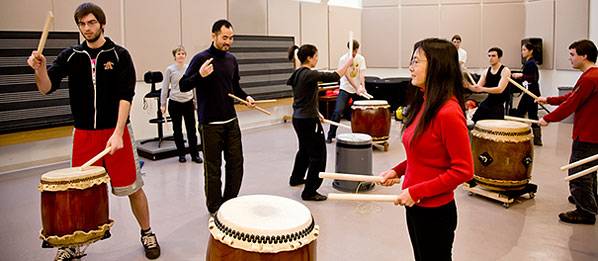
During a session of her course on popular music in Japan, Manabe and her students participate in a workshop with taiko drummer Kaoru Watanabe (center) on Japanese ensemble drumming, which is popular both in Japan and North America. (Photo: Denise Applewhite)

